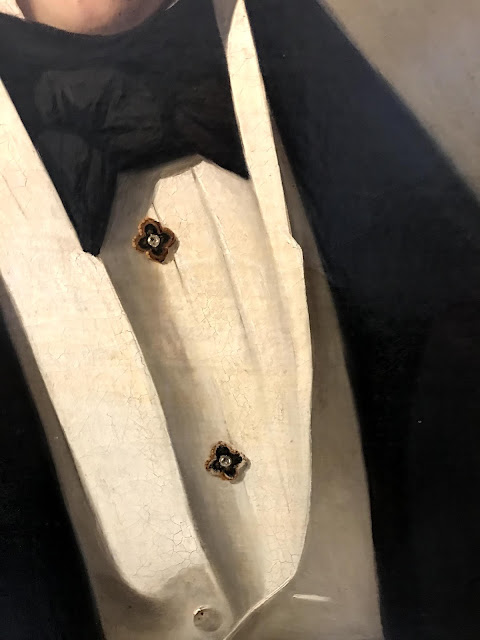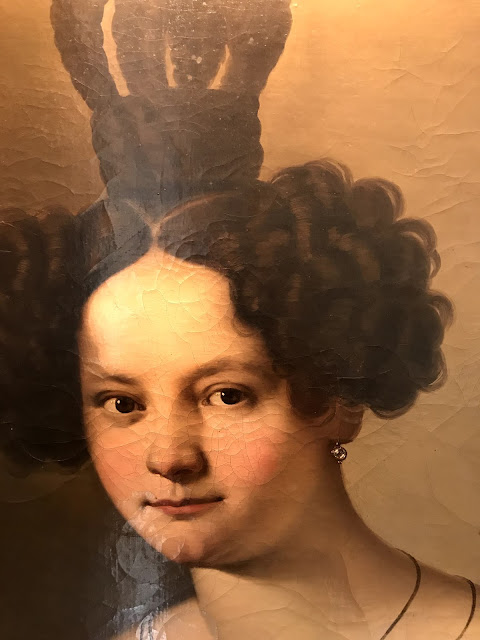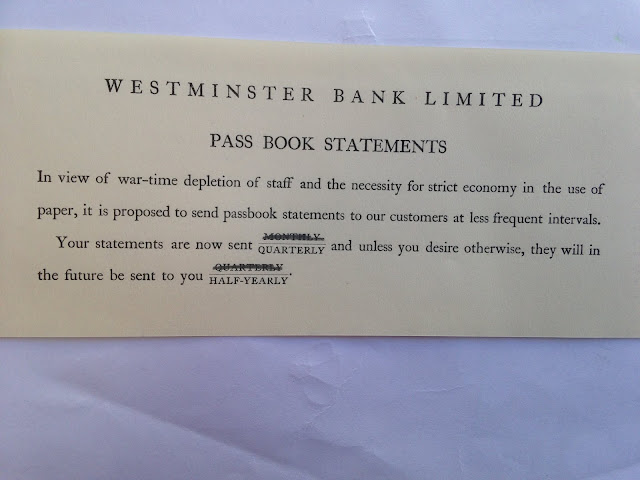Ernest Frederick Schiff was the third son of Leopold and Hänchen Schiff, born in Trieste on Christmas Day 1840. He was one of the three sons born close together, Charles, Alfred and Ernest, and he had a distinguished and successful career, though he was also the only one not not marry and leave descendants.
I know nothing of his early life and education, nor of his early career. It was a great surprise when I discovered his existence, together with his brother Alfred, in London in the 1870s, where they were making a fortune on the London Stock Exchange making good use of their European connections. His jaundiced obituary in The Times of 7th November, 1918, was coloured by the war that was about to end, but it does give some clues to his career:
"He was the prominent partner in the well-known firm of Messrs. A.G.Schiff and Co., of Warnford-court, E. C. This business was founded by his brother Alfred, and it built up a very good Continental connection. Sir Ernest became a member of the House 41 years ago, but was connected with the Stock Exchange for some time before his admission. He was an able man, and considerably developed the business after he became its head"
In the 1871 census he is recorded as living with his brother Alfred, together with Alfred's wife and two children, at 24, Leinster Square, an impressive mansion that still stands in Bayswater. Here he is described as being Austrian. We do know that he was naturalised as British in 1875, presumably in preparation for his acceptance as a member of the Stock Exchange. In the 1881 census he is recorded, aged 40, as living with his older brother Charles, both unmarried, and Charles still of Austrian nationality, at 36, Sackville St, Westminster, together with a housekeeper and a housemaid, and both described as colonial merchants.
In the 1891 census he is listed as living as a at 40, St James Place, Westminster. His occupation is given as a broker and, curiously and incorrectly, his age is given as 78, rather than 50.
There are rare mentions of him in the press at this time: as a donor to various appeals, such as the Brightlingsea Gales Disaster of 1883. He was also active in promoting relations between Britain and the Austrohungarian society, such as being Honorary Secretary of the impressive ball arranged in 18--, in the presence of the Prince of Wales and Crown Prince Rudolf of Austria-Hungary and innumerable British and continental notables. We know from his obituary that in his lifetime he was awarded the honours of becoming a Knight of the Imperial Austrian Order of the Iron Cross [surely Iron Crown], also a Commander of the Order of Francis Joseph with Star, and in 1911 King Edward VII awarded him a knighthood as a Knight of Grace of St John of Jerusalem.
There are also many minor mentions of Ernest as an owner of racehorses around the turn of the century, a small glimpse of the pleasures of a wealthy batchelor. We are fortunate in that he is mentioned in the autobiographical works of his nephew Sydney Schiff who helps this man to exist in our imagination. I have not traced a photograph of him, but a bust in bronze has been handed down in the family of his brother Charles, and is decorated each year at Christmas-time. This bust was singled out for praise in a scathing review of the Royal Academy exhibition of 1912, printed in the New York Times on May 12th: "A really good piece of work is the bust of Sir Ernest Schiff by Emil Fuchs. It is strong and refined in modelling and reveals knowledge and conscious thought."
This is a description of Ernest and Alfred written by Sydney, and set at the time of the death of Alfred's wife in 1896 (William is Alfred, and Frederick is Ernest):
Two brothers could hardly offer a greater contrast than William and Frederick Kurt. William was considerably above middle height, slight and well proportioned. He wore a short, square-cut beard which, originally red, had turned gradually, with years, to a golden-grey. His hair, uncommonly plentiful for a man approaching sixty, curled away from its central parting in large, crisp, grey-brown waves above a forehead unusually high and broad and white. The eyes, generally averted save for swift glances, were dark, small and very piercing; the mouth was intensely flexible, with full but not thick red lips showing through the hair. When he spoke he had a way of turning his head sideways. The habitual pose was that of concentrated attention. One felt that nothing escaped him. The arms were usually held behind the back, one hand resting easily in the other; occasionally one would be used sparingly for gesture; the hands were noticeable, they were slender and symmetrical, with long fingers, and downed with red hair.
William Kurt rose as his brother entered and went to meet him, and the two stood talking for a moment in low tones. Thus one could best observe the difference in height, build and gesture. Frederick was short, of square stout build, clean-shaved but for a trifle of whisker. His dark grey hair was thicker, the curls were closer, the lips thinner. The eyes were of lighter colour and the pose lacked William's grace. The head was equally small and well shaped, but the forehead was wanting in distinction, and the neck was thick. The one pronounced thing about the man was a look of firmness and decision; in his voice, in his manner of standing, in his look of contemptuous inattention, one read self-confidence and self-esteem. He seemed the embodiment of dogmatic strength, an epitome of self-reliance.
There was an indefinable foreign air about the two difficult to analyse or describe. Apart from the readiness with which they dropped into French, German or Italian, there was nothing in manner, expression or gesture which one could identify as un-English. In spite of this it permeated their being and caused in both brothers a certain lack of conformity which drew attention to them. This was heightened, in the case of William, by a natural distinction of appearance, by the carrying of the shapely head, and by a manner which to women was caressing and to men courteous and urbane.
As they exchanged low-spoken words each seemed to avoid the other's eyes with a noticeable persistence. There was no purpose in this. It was a habit, significant only to those who seek mutual response in expressive glances. In each man's case it was the unconscious symbol of an habitual reserve, enabling him to mask his feelings and protect his heart against sentiment or appeal. The brothers had for each other a love passing that of women. Yet at this moment of almost tragic intensity, from no single outward act, gesture or expression could any stranger have imagined the passionate sympathy that united them.
Ernest was certainly close to his slightly older brother Alfred, as this account makes clear. It was the death of this beloved brother on 2nd August, 1908, which galvanised Ernest into the activity for which he is best and most appropriately remembered: the creation of a convalescent home to perpetuate his brother's memory. This was generously endowed and was known as he Schiff Home of Recovery. It survived until 1980 when it was sold to the Wellcome Foundation. Now, perhaps appropriately, it is the headquarters of Cargill, the international commodity traders.
Knighted in 1911, Sir Ernest was profoundly affected by the outbreak of the First World War and its unpleasant xenophobia. In his obituary The Times tells us "In recent years he had not played an active part in the business, and after the outbreak of war scarcely ever visited the Stock Exchange." From the beginning of the war xenophobia grew alarmingly. In particular, there was much anti-German feeling in the countryagainst whom feelings were vented. Action was taken to reassure popular feeling, and to show that people of foreign origin were not the enemy withing, and though this action was taken, it did little to diminish hostility at any level in society.
"Loyal to Their Adopted Country
The Lord Mayor of London received at the Mansion House, to-day, a deputation of British subjects of Austro-Gungarian birth resident in London, who presented to the Lord Mayor a memorial expressing their feeling of loyalty to his majesty and devotion to the country. The deputation, which numbered twenty, was led by Sir Ernest F. Schiff."
There was a similar mention on May 13th:
"There is an insistent movement on foot to compel naturalised British subjects of German extraction to avow their loyalty to the King. Many prominent banking and business men are responding to the appeal, including Sir Felix Schuster, Mr. Ernest Schuster, Sir Ernest Frederick Schiff, Sir Carl Mayer and Sir Felix Simon."
Sir Ernest Schiff wrote a letter to The Times in May, 1915, deploring German atrocities.
In truth, the war broke his spirit. His brother Charles lost his younger son Martin in April, 1916, and Sir Ernest's great nephew Alfred, son of his brother Alfred's son Ernest, was killed in April 1917. He had proudly affirmed his loyalty to Britain and the empire from the very beginning of the conflict.
In May, 1918, the loyalty of the firm was questioned in the House of Commons:
"Mr Watt asked the Home Secretary what is the nationality and business of the partners of Schiff and Company, of Throgmorton Street, who at present employ E. A. Meyer, who was ordered out of Westcliff-on-Sea for pro-German conversation and action, and is his Department satisfied if it is safe to allow them freedom daily in the City?
Sir G.Cave: I understand that this firm is carrying on the business of a stock and share broker and that there are four partners, of whom two are naturalised British subjects of Austrian origin, naturalised in 1875 and 1878 respectively, while the other two are natural-born British subjects. I know of no reason, whatever for doubting the loyalty of any of the partners."
Sir Ernest Schiff died in his home at Carlos Place on 5th November, 1918, and was buried on Armistice Day, 11th November, 1918 at Brookwood Cemetery. His will is extensive, and worthy of separate study, and he left an estate of £1,056,000, an enormous sum, but in fact much diminished by the effects of the war. An executors' sale of items from his flat at 1, Carlos Place, Mount Street, Middlesex was adverised to take place on 12th February, 1919:
"Silver Plate and Objects d'Art, including a collection of Marriage Bowls and Wine Tasters, with coins inset, a gilt box inset with 39 English gold coins, a set of Georgian gilt fruit baskets, and dessert knives and forks, with mother-o'-pearl handles, two Georgian tea and coffee services, inkstands, goblets, salvers, centre bowl, and a pair of 24-inch 5-light candelabra. A Collection of gold, enamelled, and tortoiseshell snuff boxes, miniatures, bijouterie, etc. Porcelain and decorative Items."
The following day, 13th February, 1919, the additional sale took place of:
"The Collection of Pictures and Drawings, including several works by the late Byam Shaw, and others by
G. Aureli
F. Brunery
C. L. Bulleid
E. F. Brickdale
G. Chambers
L. Donzette
M. Menpes
L. Neubert
H. Rondel
N. Tyndale
E. Thorn Waite
Portietje
Signed proof engravings and etchings, framed and in the folio; coloured and other sporting prints, bronzes and statuary."
In his lengthy and complex will Sir Ernest had left legacies to two of his sisters: Giustina Rodenberg in Berlin and Jenny Schiff in Hamburg. These legacies were affected by the situation of the two countries being at war - still just - at the time of Sir Ernest's death, and the case had to be decided by he High Court of Justice. I admit I cannot understand the ruling that was eventually given, but it does appear that Giustina did leave estate in England at her death.


































































































